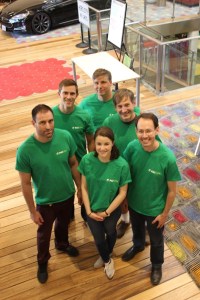Lerato Motloung is a mother of two who works in a supermarket in Johannesburg, South Africa. After her phone was stolen, Motloung had to go without a mobile phone for nine months because she could not afford a new one. Then, in February 2024, she saw a sign about PayJoy, a startup that offers lending to the underserved in emerging markets. She was soon able to buy her first smartphone.
Motloung is one of millions of customers that San Francisco–based PayJoy has helped since its 2015 inception. (She was its 10 millionth customer.) The company’s mission is to “provide a fair and responsible entry point for individuals in emerging markets to enter the modern financial system, build credit, achieve economic freedom, and access digital connectivity.”

PayJoy became a public benefit corporation last year and is an example of a company attempting to do good while also generating meaningful revenue and running a profitable business. And, unlike other startups offering loans to the underserved, it’s doing so in a way that’s not predatory, it says.
“We meet customers where they are — even with no bank account or formal credit history, we create access to financial services and carve a path into the financial system,” said co-founder and CEO Doug Ricket.
PayJoy is applying a buy now, pay-as-you-go model to the estimated 3 billion adults globally who don’t have credit by allowing them to purchase smartphones and pay weekly for a 3- to 12-month period. The phones themselves are used as collateral for the loan.
While the loans are interest free, with no late or hidden fees, the company does mark up the price it charges for the phones by a “multiple,” Ricket said. But it shares the full price upfront before customers sign a contract.
“Users will never pay more than the disclosed amount and can return their phone and walk away debt-free at any time,” he says.
If a customer does miss a payment, their device is locked and is unusable outside of contacting PayJoy or emergency services. To unlock the device, the user needs to make a single weekly payment and the device will then be unlocked for 7 days.
Adds Ricket: “Even upon serious delinquency, PayJoy does not repossess the device and does not communicate individual loan performance to retail partners. PayJoy does report loan performance to credit bureaus including both positive and negative history, so their credit report will be affected accordingly.”
By the fourth quarter of 2023, PayJoy had achieved an annualized run rate of more than $300 million, Ricket told TechCrunch exclusively. That’s up from $10 million in 2020, when it first introduced lending. And the company was “net income profitable” in 2023. It also managed to raise significant capital during a challenging fundraising environment. Last September, PayJoy announced that it had secured $150 million in Series C equity funding and $210 million in debt financing. Warburg Pincus led its equity raise, which included participation from Invus, Citi Ventures and prior lead investors Union Square Ventures and Greylock.
PayJoy has come a long way since TechCrunch first profiled it in December 2015 when it had secured $4.3 million in equity and debt about 10 months after its inception.

Today, the company operates in seven countries across regions such as Latin America, India, Africa and most recently, the Philippines — providing over $2 billion of credit to date. In October of 2023, the company launched PayJoy Card in Mexico, providing customers who have successfully repaid their smartphone loans with a revolving line of credit. Ricket says that PayJoy can “enable cheaper credit and … reduce default rates” by using data science and machine learning to underwrite its loans to assess a customer’s creditworthiness. He says 47% of its customers are women, 40% are new to credit and 37% are first-time smartphone users.
Ricket was inspired to start PayJoy after serving in the Peace Corps following his graduation from MIT. He then spent two years as a volunteer teacher in West Africa, where he became interested in technology in the context of international development. After the Peace Corps, he landed at Google, where he helped create the world’s first complete digital map.
Ricket then moved back to West Africa where he worked for D.Light Design in the pay-as-you-go solar industry. All of that experience has been combined in PayJoy.
The company is on track to achieve over 35% revenue growth this year, with strong momentum in Brazil and new product offerings in development, according to Ricket. Presently, the company has 1,400 employees. It has raised more than $400 million in debt and equity over its lifetime.
Want more fintech news in your inbox? Sign up for TechCrunch Fintech here.































Comment